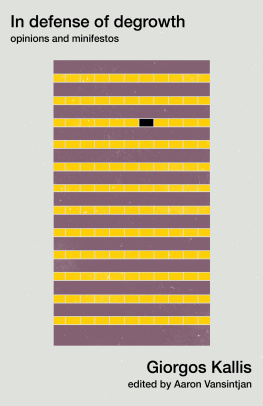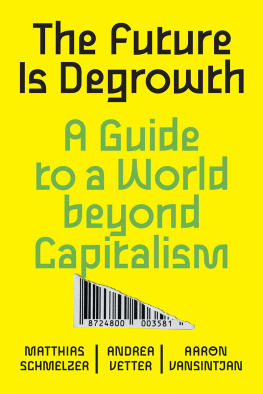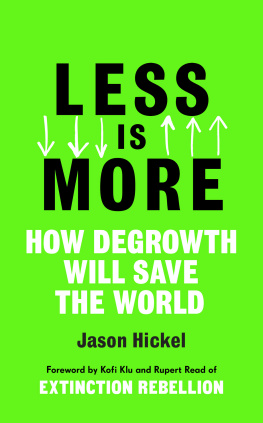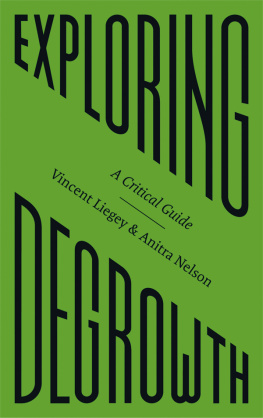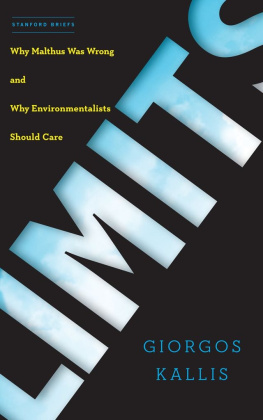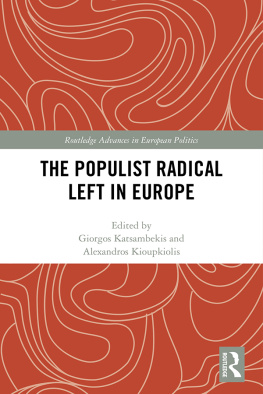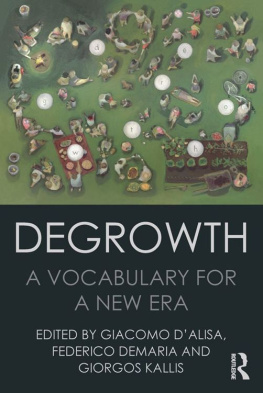In defense of degrowth - Giorgos Kallis
Here you can read online In defense of degrowth - Giorgos Kallis full text of the book (entire story) in english for free. Download pdf and epub, get meaning, cover and reviews about this ebook. year: 2017, genre: Politics. Description of the work, (preface) as well as reviews are available. Best literature library LitArk.com created for fans of good reading and offers a wide selection of genres:
Romance novel
Science fiction
Adventure
Detective
Science
History
Home and family
Prose
Art
Politics
Computer
Non-fiction
Religion
Business
Children
Humor
Choose a favorite category and find really read worthwhile books. Enjoy immersion in the world of imagination, feel the emotions of the characters or learn something new for yourself, make an fascinating discovery.
In defense of degrowth - Giorgos Kallis: summary, description and annotation
We offer to read an annotation, description, summary or preface (depends on what the author of the book "In defense of degrowth - Giorgos Kallis" wrote himself). If you haven't found the necessary information about the book — write in the comments, we will try to find it.
Unknown: author's other books
Who wrote In defense of degrowth - Giorgos Kallis? Find out the surname, the name of the author of the book and a list of all author's works by series.
In defense of degrowth - Giorgos Kallis — read online for free the complete book (whole text) full work
Below is the text of the book, divided by pages. System saving the place of the last page read, allows you to conveniently read the book "In defense of degrowth - Giorgos Kallis" online for free, without having to search again every time where you left off. Put a bookmark, and you can go to the page where you finished reading at any time.
Font size:
Interval:
Bookmark:

Opinions and Minifestos
Giorgos Kallis
Edited by Aaron Vansintjan
March 2017
This book is made available free of cost. Editing and formatting took six months of work. Help us recover some of the costs for this work by donating at .
The material in this book is under a Creative Commons Attribution-NonCommercial license (CC BY-NC 4.0).
Under this license, you are free to:
Sharecopy and redistribute the material in any medium or format
Adaptremix, transform, and build upon the material
Under the following terms:
AttributionYou must give appropriate credit, provide a link to the license, and indicate if changes were made. You may do so in any reasonable manner, but not in any way that suggests the licensor endorses you or your use.
NonCommercialYou may not use the material for commercial purposes.
Praise for In defense of degrowth
Im thrilled that Giorgos Kallis, one of the worlds foremost thinkers on degrowth, is making this essay collection available for free. Whatever your level of familiarity with the subject, the books mix of engaging commentary, bold analysis, and creative policy tools is certain to deepen your thinking.
Naomi Klein, author of This changes everything and The shock doctrine
In defense of degrowth shows why its author, and the Barcelona group to which he belongs, have become the indisputable world leaders in the vital project of crafting novel economic imaginaries and feasible frameworks for an age where, literally, everything has to change.
Arturo Escobar, author of Encountering development: The making and unmaking of the Third World and Feel-thinking with the Earth.
To my mother, Maria. I am writing for and with her.
This book is a collection of opinion essays, newspaper articles, and blog posts I wrote the last four years to communicate my thoughts and research to a non-academic audience. I wrote them for three reasons. First, because I wanted to talk toand withpeople outside the university. I wanted to make sure that the ideas we were developing with my friends in Research & Degrowth Barcelona did not stay locked within the pay walls of scientific journals. Second, because I felt a need to intervene in public debates; that I am doing something that may make some, even if tiny, difference in the face of the turmoil, chaos, but also hope, that was engulfing us in the South of Europe. Third, because I wanted to throw and test some half-baked ideas, without waiting for the long academic process of researching the literature, examining what others have said before, confronting my hypotheses with evidence and all the rest. There is a place and moment for reason and rigour, and there are also moments where intuition and passion are called for. Some of my essays are communicating well-founded and empirically supported claims. Others are just pitching concepts and ideas that someone else might want to follow up on, or are simply making emotional pleas for a different course of action.
Writing these essays was not an easy experience. I have mastered the art of writing an academic paper and getting it published, but I was never taught how to write something that a friend can read. My academic writing is clunky at times, but this is fine since it is other clunky writers that evaluate my work. A clunky blogpost, though, will simply not be read. It is a hard moment of truth when you try to simplify your ideas, only to find that you cant. You can no longer hide your own confusion behind complex concepts, impenetrable language, or elaborate math. What you say either makes sense, or doesnt. And if it doesnt, or if you cant express it in a way that it does even if you feel that it does, then frustration, if not depression reigns. What a great satisfaction though, when it does make sense, when language and emotion sync, as I feel they do in The battle for Harvard (chapter 8), or The Wolf of Wall Street (chapter 10)!
The essays included here were written at different times, for different audiences and with different purposes in mind. Some are more academic, others, more direct. Some of the same ideas may appear and re-appear in different articles, in different forms with different words. I want to think that this is not repetition, the same refrain played over and over, but rather different variations on the same musical motive, played one way here, and in another there.
We organized this collection in seven parts. The first part consists of four articles I wrote to present the idea of degrowth in simple terms. These four essays were written at different stages of development of my thoughts on degrowth, and for different audiences. I call them minifestos. They are passionate declarations in support of degrowth, but without the claim to grand theory or certainty that would characterize a manifesto. They are the entry point to this book for the reader not familiar with the core claims behind the missile slogan degrowth.
Part II includes three essays establishing an antagonistic dialogue between degrowth and its arch-nemesis, eco-modernismthat is, the idea that all environmental and social problems can ultimately be solved with the application of technology, and that the only solution to the problems of modern technology is more modern technology. I argue that eco-modernism is factually and conceptually wrong, though funny at times.
Part III is about economics, but its three essays are very different in content and scope. First, I tell a little known story of how dissident voices were purged from the field of economics and university campuses in the early 70s. Then I propose five principles for a new economics, drawing from concepts and ideas developed in our recent book Degrowth: A vocabulary for a new era ( vocabulary.degrowth.org ). Then I turn film critic to describe the enigma and magic of capital in Martin Scorseses The Wolf of Wall Street .
Part IV has some half-baked thoughts on capitalism, socialism, and degrowth, and Part V turns into the politics of and the policies for degrowth, starting with ten policy commandments and moving on to a series of mini-interventions ranging from work-sharing and Keynesian policies by Spains Podemos, to AirBnb, the Popes Laudato Si , and the hopes fueled from Barcelonas new city government.
In Part VI I engage with critiques. It is through these engagements that the nuances and uncertainties in my own claims come to the fore. Common criticisms concern both whether degrowth is necessary, and whether the term is appealing and mobilizing. Sometimes the two critiques, or my own responses, mix the two issues. I am sure that what is expressed by degrowth is valid, and the transformations we espouse are necessary. I am less certain of the term, though I defend its use. But no doubt, the debate on both questions is open and ongoing.
In Part VII I come back home. I close with three essays originally written in Greek, which concern the country where I was born and raised, Greece. A few years ago, a focus on Greece might have seemed an idiosyncratic and too personal of a choice, but today it no longer is. Greece with its Great Depression has come to signify the economic crisis at its worst and to embody all that is going wrong with Europe and the West. I am sharing here three fragments of a thought, the two cents of a Greek of the diaspora.
The ideas in the essays were developed over the years through discussions and debates within the Institute for Environmental Sciences and Technology (ICTA) at the Autonomous University of Barcelona ( icta.uab.es ), and the Research & Degrowth collective in Barcelona ( degrowth. org ). I am grateful to all my companer@s in R&D, and my colleagues and students at ICTA, especially to my good friends and co-authors Giacomo DAlisa and Federico Demaria with whom I have co-developed most of my thoughts on degrowth. I thank the editors of the outlets for which I wrote these essays and my co-authors for those articles that were co-written.
Font size:
Interval:
Bookmark:
Similar books «In defense of degrowth - Giorgos Kallis»
Look at similar books to In defense of degrowth - Giorgos Kallis. We have selected literature similar in name and meaning in the hope of providing readers with more options to find new, interesting, not yet read works.
Discussion, reviews of the book In defense of degrowth - Giorgos Kallis and just readers' own opinions. Leave your comments, write what you think about the work, its meaning or the main characters. Specify what exactly you liked and what you didn't like, and why you think so.

